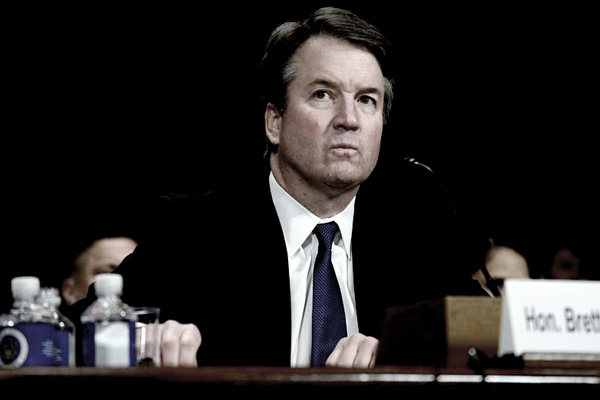Top 10 Defenses of Kavanaugh (and What’s Wrong With Them)
Tuesday, October 2nd, 2018 • Politics / Writing

1. Innocent Until Proven Guilty
This began mainly with Lindsey Graham, who, before Thursday’s hearings, reminded us of his own experience as a defense attorney. The rebuttal, of course, is that Kavanaugh is not on trial—the committee’s evaluation is founded upon an entirely different and more abstract set of principles. The Senate Judiciary Committee has full discretion to vote however they see fit; the Constitution provides no qualifications for SCOTUS justices and the process has nothing to do with rules of evidence or other elements of criminal investigations.
2. No Proof
Commenters have been apoplectically insisting on this, but it misses the point. There may in fact be no real way of determining beyond a reasonable doubt what happened in that room, but the operative question is the dishonesty and lack of character and judgment with which Kavanaugh has defended himself in the present time, and what this behavior reveals about his temperament and judgment (obviously important for a judge). And, there’s plenty of proof, not just that he lied repeatedly to the Committee, but specifically about the evening in question. (Not to mention the existence at least one eyewitness who has yet to testify under oath, whose appearance before the Committee would obviously address a need for “proof.”)
3. Ford Can’t Remember
(Including variations: Ford was coached; the therapists have planted the memories; she’s exaggerating etc.) This might work were the witness not a professor of psychology (at Palo Alto University) and a research psychologist at the Stanford University School of Medicine, fully willing and able to present her memories within a rock-solid academic framework. The well-founded psychological studies cited by Ford and others demonstrate that traumas of this kind are well-remembered despite delays in their being reported.
4. It’s a Liberal Conspiracy
Clearly the most widespread and deep-rooted—and angriest—meme in use within the Senate chamber and in remarks to reporters. The problem is the timeline (see below): for Ford to have been “put up to this,” as a pawn in a devilish larger game (with Dianne Feinstein and her infamous letter in the Linda Tripp rôle), we would have known about all of this long in advance of the hearings; it’s hardly a tactical advantage to wait until the final week of deliberations.
5. It’s Bad For Boys
Donald Trump Jr. has, of course, dived headfirst into this one: How are we supposed to protect our male progeny in a world where “any man” may be “destroyed” by accusations of rape? [Trump Jr.’s tweet may be the best example of this one.] Only between 2% and 10% of rape reports are determined to be false, and statistics regarding more general harassment claims are not much different.
6. He Was a Kid
The “youthful indiscretion” argument was successfully used by George W. Bush’s father and other supporters in 2000 to defend against recently-unearthed reports of the then-candidate’s 1976 DUI guilty plea (when the “youth” was thirty). The counterargument, of course, is Trayvon Martin, Trump-era detainees, and countless other American who are forced to sacrifice everything up to and including their lives in payment for their behavior as teenagers.
7. It Was a Long Time Ago
Variation on #6, adjusted to address changing morés in society; John Hughes movies etc. (and men’s sarcastic ripostes about how “these days” they’re “not allowed” to make certain remarks to women; grab them etc.). This gets into the broader arguments of the entire #metoo movement, and, therefore, into deep waters, but it’s nevertheless easy to point out that Kavanaugh’s alleged actions that night would be criminal in any decade—and, according to a former Deputy Attorney General of Maryland (where the alleged attack occurred), “attempting a sexual assault with the aid of another person counts as attempted first-degree rape, just as restricting a victim’s breathing to stop her from shouting for help could fairly qualify as first-degree assault. Both are felonies with no statute of limitations in Maryland.”
8. He’s Been an Outstanding Citizen/Lawyer Ever Since
Maybe, if you don’t look too hard at the rôles he played, not just in Ken Starr’s odious Whitewater/Lewinski impeachment proceedings, but during the 2000 Florida recount (and its famous “Brooks Brothers Riot”). In other words, Kavanaugh is a past master at precisely the sort of formalized smear campaign/character assassination that he’s insisting he’s the victim of, today.
9. This Was Sprung on Senators at the Last Minute
The timeline was dictated by Ford’s wish to remain anonymous—her original complaints came to Senator Feinstein long before Kavanaugh was even the final White House choice as nominee. (All of this was exhaustively covered in her testimony.)
10. We’re Politicizing It
This is the most directly philosophical and abstract argument for Kavanaugh’s confirmation and the hardest to refute, since the question of how one does or not “politicize” what’s been tacitly understood to be an implicitly political process since at least the days of Oliver Wendell Holmes remains unclear. The low-hanging-fruit rebuttal is, of course, the Republican-controlled Senate’s refusal to confirm Merrick Garland, which is clearly the most blatantly political treatment of a SCOTUS nominee in history—Robert Bork’s insistence that his 1987 rejection was “political” did not get taken seriously at the time (Senator John Warner’s Senate-floor speech declaring President Reagan’s statement that the opposition to Judge Bork was a ”lynch mob” was ”unbecoming the office of the Presidency” is, of course, quaint by Trump-era standards).
Bonus Argument: I Don’t Care; I Just Want Him On The Court
As the proceedings continue to drag out, this increasingly frantic position gains ground, being impulsively blurted out more and more—but the rebuttal is, as with #10, philosophical. Expediency, hypocrisy, realpolitik and moral/ethical dilemmae are of course no strangers to politics, but maybe the best response to this one is simply to let it stand, as an emblematic symbol of just how far the principles of American governance have fallen in this dark and turbulent era.